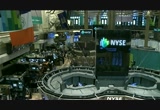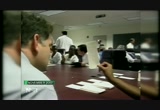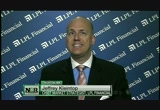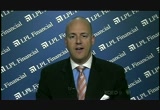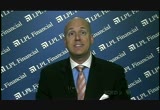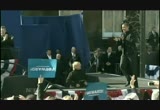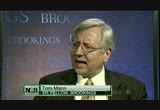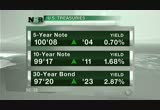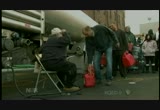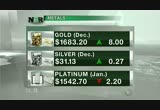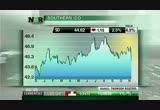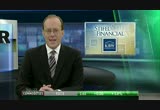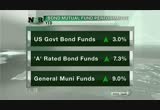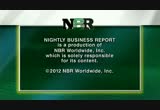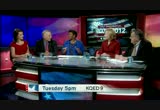tv Nightly Business Report PBS November 5, 2012 7:00pm-7:30pm PST
7:00 pm
>> this is n.b.r. >> susie: good evening everyone. i'm susie gharib. the clock is ticking to election day, just hours away before americans to go to the polls. a look tonight at what wall street wants most from the presidential election: an answer. >> tom: i'm tom hudson. meantime, with the election expected to be close, and the fiscal cliff fast approaching, how republicans and democrats interpret the election results will set the tone for the talks. >> susie: and a double whammy for people in new york and new jersey: another storm takes aim at the region, as sandy's recovery slogs on, and the hunt for fuel heats up. >> tom: that and more tonight on "n.b.r."! >> susie: the u.s. presidential election is just one day away, and that was the hot topic here on wall street. but investors were still cautious about making major moves ahead of the election, so stocks posted just modest gains, and trading volume was light.
7:01 pm
the dow rose 19 points, the nasdaq added 17, and the s&p up three points. but, where stocks go from here may depend on who wins the white house tomorrow night. suzanne pratt reports. >> reporter: wall street is hardly back to normal, with reminders of hurricane sandy still obvious everywhere. but, at least the presidential election could provide a distraction for those coping with the storm's aftermath. the question is will the stock market continue to distract in the days following tomorrow's big contest? that may depend on its outcome. like many on wall street, nyse trader jonathan corpina predicts a mitt romney win will be a big win for stock prices. >> i think when you see new regimes, new presidents come in to play in sort of a turmoil time, that change is always viewed as good and the market views that as good news. >> reporter: on the other hand, corpina doesn't think the re-
7:02 pm
election of president obama will trigger a selloff. more likely he would expect to see status quo for stocks. >> i think people have bought into the fact that the market is going to take a long time to recover, our economy is going to take a long time to recover and the market has seemed to stay on the track so to speak. >> reporter: of course there is also the possibility however remote, that it might take days before we know who will occupy the oval office. that's a scary flash back to the hanging chad debacle of the 2000 election. >> i think the odds are against it. i shudder to think. but, you remember how bad it was back in 2000. it was crazy, it drove people crazy, it drove the market crazy. i don't think that happens. i think one of these guys wins handily. >> reporter: and, then there are those who believe the stock market will rally no matter who wins tomorrow. that's because at least some uncertainty will finally be
7:03 pm
removed from the market. suzanne pratt, "n.b.r.," new york. >> susie: joining us now for more on the markets and the election: jeff kleintop, chief market strategist at l.p.l. financial. so jeffing i'm sure a lot of people are asking you is obama on romney better for the markets. and what dow say, without is better for stocks? >> well, it's complex answer because it really matters what the whole complexion of washington looks like t really comes down in many cases to who wins in the senate. do we have a gop sweep with a romney win or do you still have a democratic senate that can really change the complexion of what this lame duck lex looks like and what the status quo election may lend itself to a quick res luig of a lame duck session so a lot depends not just on the without wins the oval office but its next two years in congress looks like. >> susie: so talk us through that. let's say president o ba am a wins the election but you
7:04 pm
have republicans dominating in congress. what does that mean for the stock market. and vice versa, if romney becomes president romney and he has a democratic congress, if he has to grapple with. >> i will service its second one first, if romney has to deal with a democratic congress, really a democratic senate the house probably stays in the hands of republicans. unlikely to craft a deal in a very short amount of timement remember we've got this fiscal cliff hitting next year and a lame duck session with a lot of that needs to be dealt with. could be very difficult, for example, unlikely to see president obama as his last act in office sign a full extension of the bush tax cut so, likely we may go over the fiscal cliff in that scenario only to try and claw our way back out of it early next year. but it could be very difficult to do. that could be a negative scenario for the markets. maybe a more positive one is a status quo election outcome where at least you know who the players are going to be, and you know generally what the terms are. they will likely come to some agreement on pit gating many of the big negative
7:05 pm
aspects of the fiscal cliff, before year end that could give markets the clarity they need so a little caution now but maybe later as a resolution formed later this year, we finally start to see a beginning of a rally and a return to the markets by investors. >> susie: where does the economy fit into all of this? is the economy just continue to limp along whether it is president obama who wins or governor romney? >> is it going to be the same? >> very likely. >> well, you know, as long as they come to some type of agreement over the fiscal cliff then yes. are you probably looking at a one-to-one inform percent drag on gdp which is pretty much how fast we are growing now. it brings us to the flat line for profits and the economy. but if we don't craft a deal of some scenario coming out of this election doesn't lend itself to a quick and easy compromise in the lame duck session which it may not, that means we have an economies that's really hit with a full brunt of the fiscal cliff, some 3.5% drag on gdp, we're most likely in
7:06 pm
a recession in that case with further pullback in spending and housing maybe, and a far deeper downturn. >> a lot of variables, a lot of factors as you have just been talking about. how should people position their portfolio is there a pre-election trade to do here? >> i think you can lighten up a little bit, have a bit of cash, i think, make some sense now along with maybe precious metals like gold and look to take advantage of any of the pullbacks in the next couple of months in this infighting in congress. i'm reminded of when we tried to increase the debt sealing in august of 2011, how that lead to a 13% rapid decline in the stock market, though we did ultimately increase the debt ceiling. we could see something along those lines but depending on the outcome of the election we could see some industries fair better than others. for example romney mentioned coal several times in the debate. coal stocks are up 25% since the first debate that could continue if romney winsment likewise better performance out of hmos and maybe some of the big banks.
7:07 pm
on the other side an obama win might mean better performance for some of the food and staples retailers on the extension of unemployment benefits and some of the beneficiaries of the affordable care act that is likely to remain in place like health-care facilities like hospitals and diagnostic labs and other health-care services companies. >> susie: all right a lot of good information, jeff, thank you so much. jeff kleintop, chief market strategist at lgl financial. thanks very much. >> tom: still ahead, tonight's word on the street: bonds, what happens to the market for u.s. i.o.u.'s if the fiscal cliff hits. the street.com's joe deaux joins us. one thing you may not be hearing late on election night is the m- word. mandate. it's tradition that the winners of an election claim to have the american people on their side. but if this election is as close as the polls predict, there will be no mandate for either side. darren gersh reports. >> reporter: unless all those polls are wrong and tomorrow brings a big surprise one way or another, this election will be
7:08 pm
the remembered as one of the closest in history. it could also end with both parties convinced the folks back home don't want them to compromise on key issues like taxes and fairness and the size of government. >> there is going to be enough room for both sides to claim that they have the mantle from the american public or that nobody does and i think that hurts the issues on the fiscal cliff. >> reporter: if the president prevails tomorrow, he will be one of the only incumbents to win re-election with fewer votes than he got in his first campaign for the white house. if romney wins, it's possible democrats will keep control of the senate. either way, the winner's claim to a mandate will look very thin this year. and that will make it hard to move forward with a clear agenda. the numbers won't justify that. they will suggest that you will have to deal with the other side because a lot of people didn't vote for you and they're part of the other side. but no one in washington is expecting this election to end
7:09 pm
with handshakes and good will. most signs now point to a status quo election. democrats keep the white house and senate and republicans keep the house with relatively few losses. despite all the money and time spent in this campaign, it now looks likely to will end with the same political math that delivered gridlock through much of the last two years. that policy uncertainty may worry investors, but politicians seem to have learned to live with it. >> in an era of deeply polarized parties, mandates aren't as important. all that matters is winning. elections decide who wins and who loses and after that, it is up to the successful party to see if the ingredients exist for getting anything done. >> reporter: if this is a very close election, we may not know the final outcome for months, as republicans and democrats fight over senate races and perhaps even the white house. and that will make it harder to find any coherent message on policy from the most expensive election in history.
7:10 pm
darren gersh, "n.b.r.," washington. >> susie: relief is rolling in for victims of super-storm sandy, but governor cuomo of new york said he still expects gasoline supplies to remain tight for a few more days. the scramble for fuel, is heating up as another storm heads to sandy's hardest hit areas, bringing with it freezing temperatures and more rain by mid-week. >> reporter: the lines for gasoline are shorter, but some stations are still without
7:11 pm
power, others did not have gas to sell, and thousands of people are still relying on generator power and desperately need fuel. but help is on the way: fema gas tankers rolled into 10 locations across new york and new jersey overnight. bringing eight million gallons of gasoline, another 28 million gallons are on the way. triple-a now estimates that 60% of gas stations in the hardest hit areas of new york city, new jersey, and long island are up and running. for those who do get gas, they'll pay more for it. gasoline prices in the northeast have increased as much as 14 cents a gallon. >> tom: 1.3 million people are still without power tonight, one week after superstorm sandy. and as susie mentioned, temperatures are plummeting, as another storm approaches the northeast. having no power and no heat is one concern. but thousands of people have also been left homeless by the storm, and that is fueling worries about a housing shortage. erika miller reports.
7:12 pm
>> reporter: the new york city metropolitan area is slowly recovering after superstorm sandy. but many homes and businesses still don't have power, or heat. >> things that took months or years to build are gone, how quickly we can get it back i'm not sure, but there will certainly be places that don't have power for a very long time. >> reporter: lack of power is more than just an inconvenience, it's also safety issue. temperatures have started hitting the low 30's, and a nor'easter is forecast later this week. so staying in unheated homes may not be an option much longer. gasoline shortages are compounding the problem. not only is there less fuel to heat homes with generators. but leaving home brings other challenges, like finding gas for travel, and a place to stay. new york's mayor estimates as many as 40,000 people in new york city may need temporary housing. but officials don't yet have a solution. the cost of the damage is staggering: between $30 and $50 billion, according to disaster
7:13 pm
modeling firm eqecat. and the possibility of more dislocated people will only make the road to recovery more difficult. erika miller, "n.b.r.," new york. >> tom: there is no doubt the damage left from sandy will take years to repair and the memories of the storm certainly will last a lifetime for those in her path. but she's just the latest natural disaster long-term investors have been faced with. i recently spoke with mark hebner, the founder and president of index funds advisors, asking him how long term investments should look at hurricane sandy. >> if they're holding a full equity portfolio they really should be looking at time horizons of like 15 or maybe even 20 years to hang on to that investment, to be in a position to have a reasonably good chance of catch turing the expected return of that portfolio. what is the risk, though, and the impact of the storm on closing stock trading.
7:14 pm
doesn't that impact investors' confidence and the market's ability to price these kinds of things right away when they are closed for two days? >> well, it might have some short term impact. it might alter some investors confidence. if you have your eye on the long-term horizon, then a couple of days really is immaterial and really should have little or no impact. over the long haul we rely on the fact that capitalism works, and corporations in a broadly diversified portfolio of 13,000 stocks from all over the world, which is what an appropriate portfolio of index fund was look like. >> tom: mark, how do you say passive am you are essentially telling investors calm down, sit on your hand, keep the long term in mind. but how do you stay pass wive so much uncertainty even beyond sandy with the economic and political uncertainty? >> sure. well, tom, this is why
7:15 pm
prices change in a free market. the job of a free market is really to set prices so that investors are properly rewarded for the risk they take. and if you think of my head as the expected return of an investment on one side we have market unsend-- uncertainty and the other side price f you have high uncertainty the price goes down so that the expected return can stay essentially the same. and when there's low uncertainty the fridays goes up and once again the expected return is held essentially constant over time. and it's the understanding of why prices change that help passive investors rely on markets to do a good job the assetting prices. you know we like to say that the only people who think that markets don't work are the north korean, the cubans and the active managers. we think that markets actually do a good job at pricing risk and over time we found that to be the case.
7:16 pm
>> susie: what did american manufactures hit hard by sandy learn from the impact of the 2011 earthquake in japan? learn about the global supply chain on: www.nbr.com, just look for the "nbr-u" tab. >> susie: here at the big board, tom, there was a little bit of news about the economy, a few economic reports, there was a little bit of corporate news. but really no compelling headlines for investors to latch on to. so the little bit of nervousness as well and
7:17 pm
reluctance going into the election. and probably more of the same tomorrow until we get the definitive answer on wednesday. >> tom: we can only hope there is a definitive answer by wednesday, opening bell. we have to get through tomorrow though. after getting through today t really was watching and waiting. u.s. stocks drifted higher, rebounding slightly from friday's sell-off. the s&p 500 saw some selling pressure in the morning. it first moved into positive territory for the session when the institute of supply management services gauge continued expanding in october, but at a slower pace, and slower than expected. 90 minutes before the closing bell, the index moved back into the green for the day, ending with a gain of 0.2%. trading volume was light on this election eve. 598 million shares moved on the big board. just under 1.5 billion traded on the nasdaq. the materials sector was the best, up 0.7%. utilities saw the heaviest sector selling, falling 1.7%. entergy powered the losses among
7:18 pm
utility stocks. it provides electricity in arkansas, louisiana, mississippi and texas. quarterly profit and revenues fell thanks to weaker demand for electricity, low wholesale prices and an income tax settlement. the disappointing results pushed entergy's share price down 4.7%. volume more than tripled with the stock closing at its lowest price since july. georgia based utility southern company fell to its lowest stock price since april after reporting its own disappointing quarterly earnings. the company pointed to mild weather and an uncertain economy for lower sales. utilities have been in focus thanks to the devastation left by superstorm sandy. two of the public traded utilities still working to get power back on, continue seeing their stocks fall. new york power company consolidated edison was down 2%. new jersey's public service enterprise group dropped another 1.2%. these are their lowest share prices since may. meantime, lower energy prices, specifically for natural gas,
7:19 pm
helped profits at fertilizer maker c.f. industries. a booming farm economy helped increase demand, making up for lower prices for its phosphate fertilizer. the stock rallied 3.2% before the company released its quarterly results after the closing bell tonight. the stock rallied about 1% from this closing price in extended hours trading. the company is optimistic about its 2013 business. it expects farmers to plant a lot of corn next year, and need the fertilizer for it. real estate website zillow also was out with its results late today. while earnings per share were stronger than expected but its forecast came up short. after closing down 5.3%, at $34.37 per share, the stock fell more than 21% in after hours trading, falling to $27 per share. the selling comes despite record usage by zillow's mobile and web
7:20 pm
platforms and record quarterly revenues. the weekend launch of apple's newest ipads may not have the hype of other apple product launches, but the company sold three million of the devices in the first three days they were on sale. that was stronger than the average estimate from analysts. shares gained 1.4%, recovering a little of what they have lost in the last six weeks. the three million sales includes the ipad mini and its newest full size ipad. a monday buyout in the banking business. stifel financial will buy k.b.w. the new company would concentrate on financial services for mid-sized companies and individual investors. stifel is the buyer, spending $575 million to buy k.b.w. the deal offers k.b.w. shareholders the equivalent of $17.50 per share. the offer pushed k.b.w. shares up 7.2%, closing just shy of the implied buyout price. the buyer fared well today too. stifel shares rallied 2.1% on the combination. four of the five most actively traded exchange traded products.
7:21 pm
the lone loser among the group, the financial e.t.f., down 0.2%. and that's tonight's "market focus." >> tom: tonight's word on the street, bonds, regardless of the winner of tomorrow's election the fiscal cliff combination of automatic tax increases and government spending cuts remain scheduled to take effect in january. joe deaux is a reporter with thestreet.com with us tonight at the nasdaq. joe, let's tackle this from the fixed income perspective. the fiscal cliff threatens the economy,-s over stock investors but what about bond investors?
7:22 pm
>> bond investors have to watch out for the fiscal cliff as well. a lot of analysts are not a souming that will completely go over it but they're really uncertain and saying you know there is a lot of repercussions that people with fixed income can v especially in municipal bonds. but i'm sure we'll get to that. >> tom: absolutely, normally uncertainty would help out the bond market. this year the bonds have done very well. there is no doubt about it but they have pealed in comparison to stocks, up double digits. government bond mutual funds up 3%. corporate invest graded a rated bond funds up 7%, general municipal bond funds up 9% all according to lipper. so they've underperformed the stock market despite all this uncertainty. >> yeah, they have. and you know, they continue to go up. you know, you have some quantitative easing going on. and so people have jumped into corporate bonds. you know, the municipal bonds have continued to be attractive. they're tax exempt. you know, so far, so good. but things could change. people have to take a look
7:23 pm
out. >> tom: let's focus on municipal bonds here. when you talk about municipal bonds are you talking about bonds underwritten by state governments, local governments and you know, the etf that follows the municipal bond market has held pretty steady despite the risk of let government spending you think that may impact state revenues, wouldn't new. >> yeah, exactly. i mean the big thing that a lot of the analysts were telling me that they are looking at when it comes to signs of the fiscal cliff, after it signs of tomorrow you have to look out for the question of broad-based tack reform and will that affect the tax exempt municipal bond. if it does, there is a lot of reason for people to jump out of it. the other argument is if we keep the tax exemption or at least partially, and income tax, personal income tax goes up, people are going to want to jump back into those somewhat tax exempt or fully tax exempt municipal bonds. and then the question of whether or not people would be grandfathered in if ultimately congress decides they're going to take that
7:24 pm
away. >> the devil is in the details, to doubt about it, when it comes to tax reform and the impact of all investors watch. about the fiscal cliff and the threat to treasury bond market because you could argue if the government is going to spend less money it needs to borrow less money, you could actually increase the value of the bonds out there in the market. >> right. so the big thing right now is with quantitative easing 3, q e3 what a lot of people are calling it, the open-ended asset backed, mortgage back securities purchases by the fed in which they're trying to force people out of the trawl safe treasuries and put them into corporate bonds. which is what we've been seeing is because of the higher prices, a lower yield. and so or because of this we're seeing a lot of people jump into these higher risk corporate bonds where they are low quality credit but giving higher yields which is what investors are looking for. >> tom: across-the-board fixed income and stock investors looking for the higher yields in times of uncertainty with the fiscal cliff still approaching.
7:25 pm
do you own any position in the funds we mentioned here tonight, joe? >> no, tom, i do not. >> tom: joe deaux at the intersection of fixed income and the fiscal cliff, with the street.com. >> susie: tomorrow on "n.b.r." it's election day, we head to the polls, to find out which economic issues are most important to voters. and with the presidential candidates raising more money than ever, we look at the big winner this election year: ad- spending. and finally, they won't be toasting election day wins in kentucky or south carolina tomorrow. both states have laws barring the sale of alcohol on election day, it applies to booze sold in stores and restaurants. the laws are a holdover from the days of prohibition, but they're still on the books some 80 years later. while it's a misdemeanor offense in south carolina, tom, a first conviction carries a $200 fine and as much as 60 days in jail. that's "nightly business report"
7:26 pm
166 Views
IN COLLECTIONS
KQED (PBS) Television Archive
Television Archive  Television Archive News Search Service
Television Archive News Search Service 
Uploaded by TV Archive on

 Live Music Archive
Live Music Archive Librivox Free Audio
Librivox Free Audio Metropolitan Museum
Metropolitan Museum Cleveland Museum of Art
Cleveland Museum of Art Internet Arcade
Internet Arcade Console Living Room
Console Living Room Books to Borrow
Books to Borrow Open Library
Open Library TV News
TV News Understanding 9/11
Understanding 9/11
